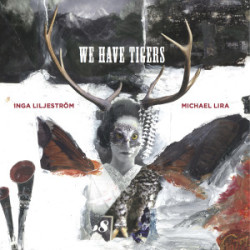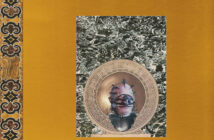Could there be any genre more fraught with possible potholes for a caucasian artist to tackle this far into the 21st century than the blues? As the western world begins to react violently against cultural appropriation of any form (another debate for which I must confess to not being particularly fond – what culture in history has not rubbed up against and then borrowed from some other culture?), the blues comes with its own history of white appropriation dating back to the late 50s and 60s, appropriations which, in turn, have birthed some of western music’s most horrid clichés and tedious dead-ends, especially for guitar players who appear to have particular difficulty seeing past its supposed omnipotence.
For her part, Inga Liljeström, on this new collaborative effort with long time off-sider, Michael Lira, continues along the path which she has always followed. An enigmatic noir can be observed throughout her winding musical trajectory. And a growing Euro-centric approach is the key to her success on this album of covers of songs that are generally pushing around 100 years old – in just their recorded forms, let alone their pre-histories of word of mouth development – mixed with original songs in a sympathetic vein. Firstly, blues guitar is not heard across the collection – the odd chime of Morricone-esque twang, near shoegaze texture or spanish guitar arpeggio are the places the 6-strings are allowed to venture – not a single bent-note histrionic in earshot. Instead, fully orchestrated soundscapes are developed – strings, dark piano, oboes, clarinets and melodicas, delicately sweeping cellos and double basses. The closest Liljeström comes to blues tradition is on ‘When I Was A Young Girl’, where she acapellas her performance to the backdrop of a light rain storm, but her voice avoids any real back-porch associations. And it is this voice which is central to the album.
Liljeström has developed, over the last decade and a half, an evocative vocal instrument which rarely breaks from a dark restraint, even when the music around her, such as in ‘Horses’ on this collection, head towards a climactic tumult. At times the orchestral style backing also tugs me to think of Marlene Dietrich, but it’s the near whisper that she often employs which is most striking, particularly as she manages to keep it completely melodic. The Berlin cabaret aural æsthetic also comes as no surprise when Michael Lira’s back catalogue is teased out. Most particularly, the gypsy moods of one of his regular groups, Monsieur Camembert, are evoked, but his strong understanding of film soundtrack creation is also clearly apparent. At times, the full orchestral effect is reminiscent of early Sufjan Stevens at his most baroque, but these moments are quickly contrasted on We Have Tigers by much more understated, sometimes even skeletal, tracks to create a sprawling array of melancholy moods, befitting the lyrical subject matter.
About half the tracks are traditional blues songs, some ubiquitous standards (‘In The Pines’, ‘(Wo)Man Of Constant Sorrow’, etc), others a little more obscure. The other half are penned by Liljeström, with input from Lira and a few others. All flow seamlessly together. It’s interesting that it’s the cover songs that are generally adorned by the more traditional instrumentation. ‘Tea To Boil’ is Liljeström’s ethereal wail with dueling banjos and teaspoon percussion, before some double bass, snare and jews harp build the finale, whereas the original ‘Bloodstain’, probably the album’s æsthetic and emotional centrepiece, sees Lira’s full orchestration almost manage to drown Ljljeström’s voice.
We Have Tigers is a success because it doesn’t treat the past as nostalgia, but as raw material for the artists to express their own conceptual and emotional impulses. There is rawness, polish, beauty and grit across the tracks. The sounds and arrangements are diverse, yet a consistent mood is draped across everything, a mood which slowly and gently sucks you into its web.
Adrian Elmer




